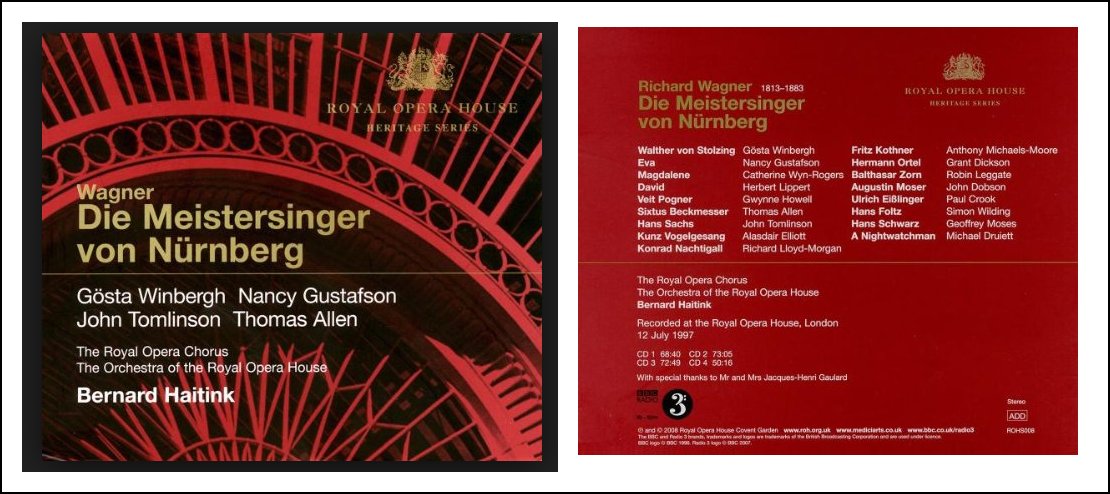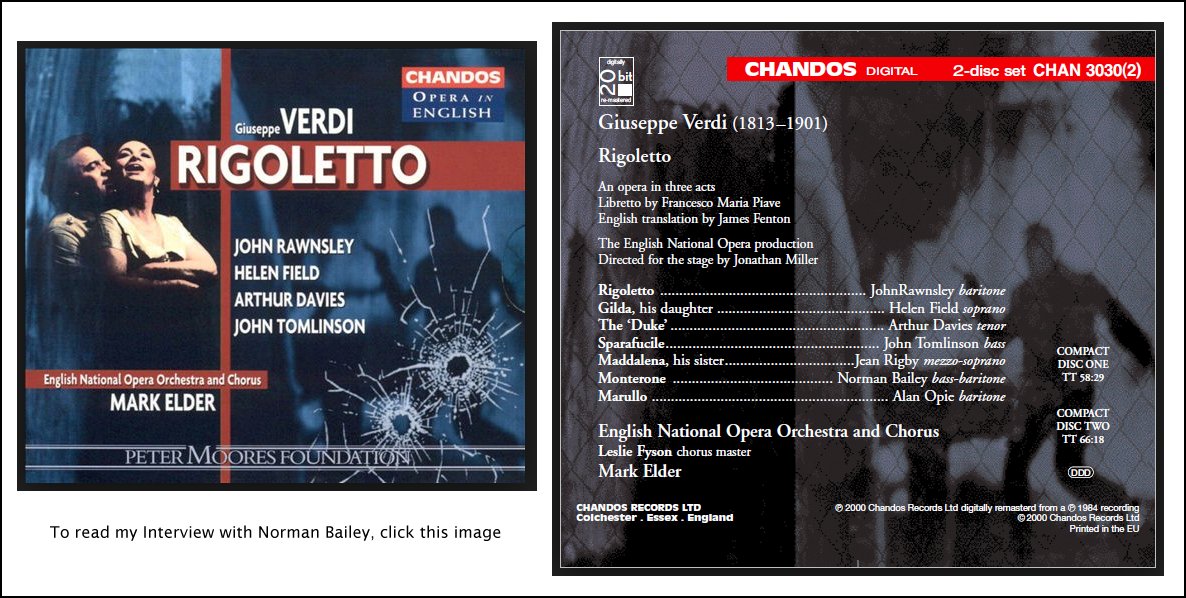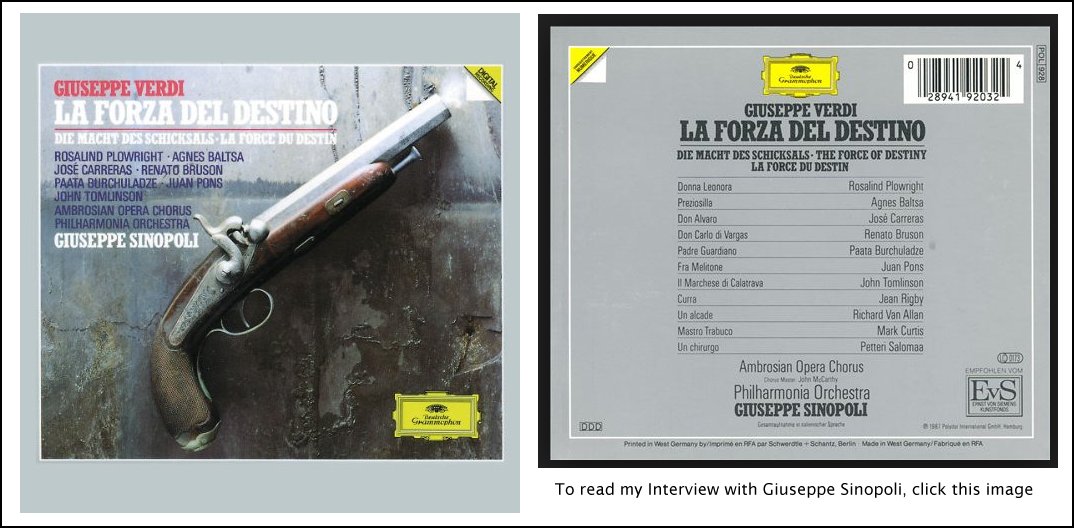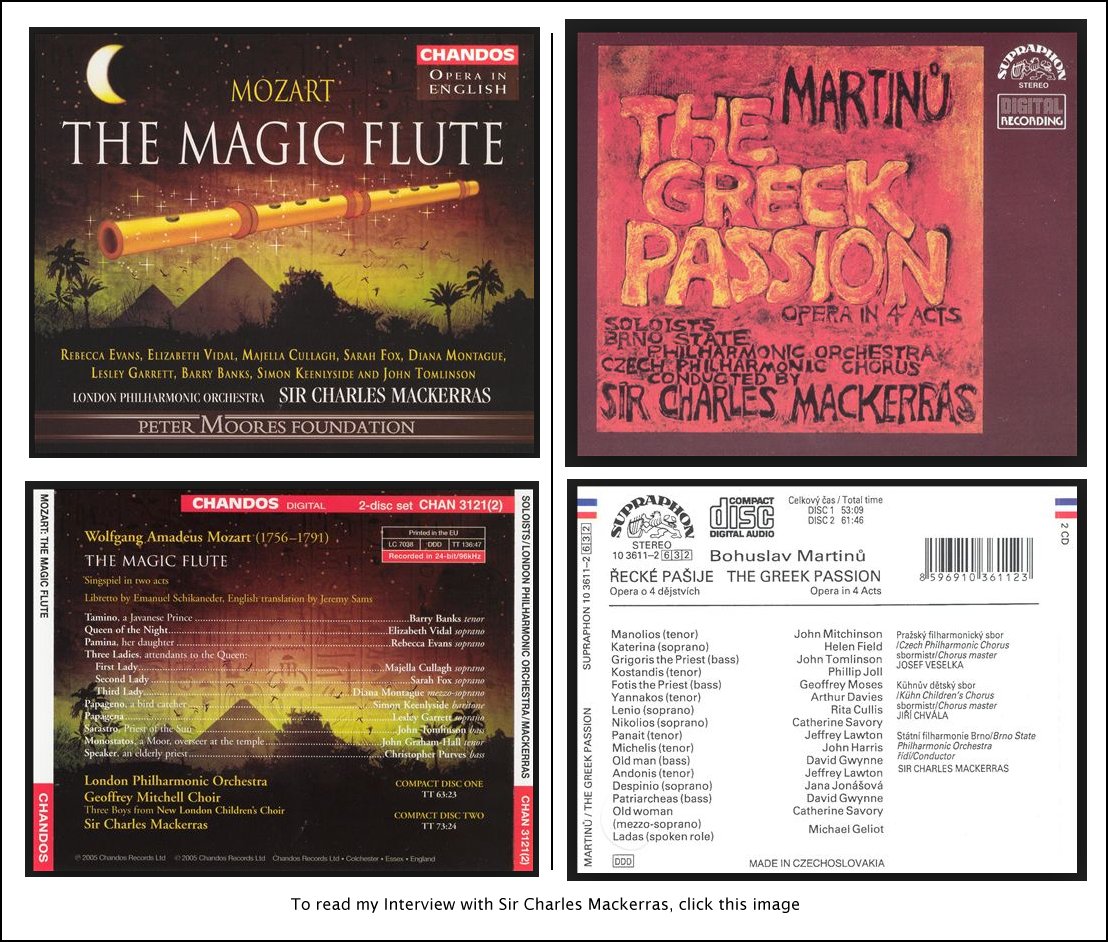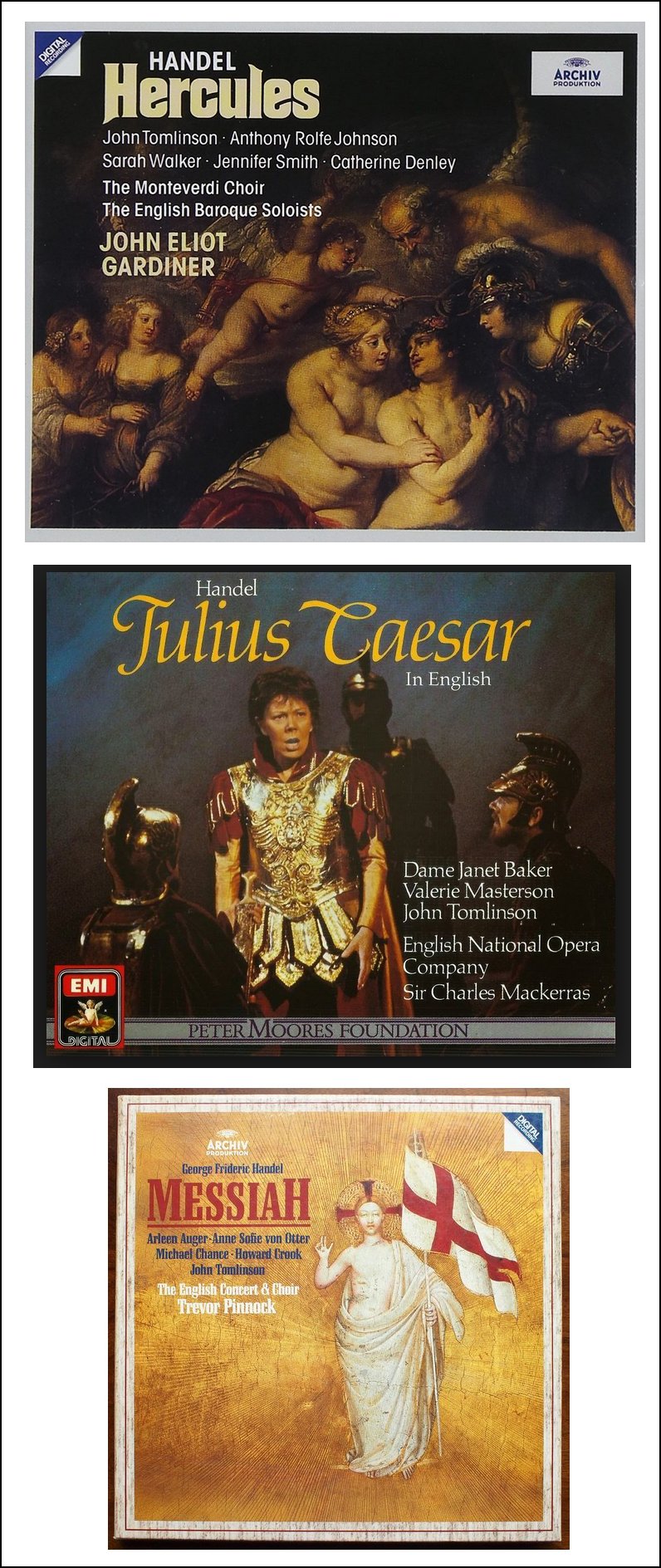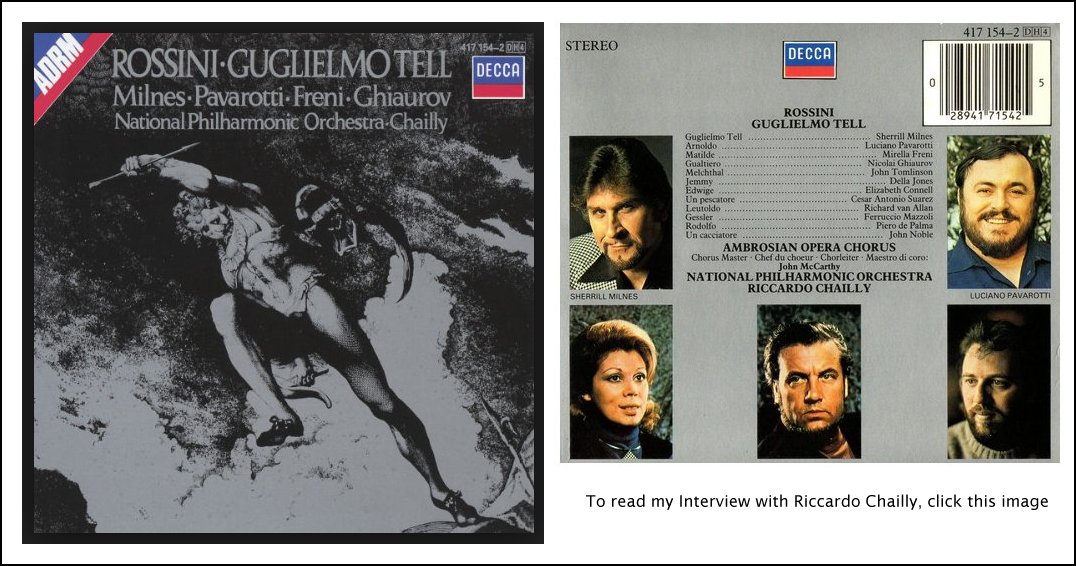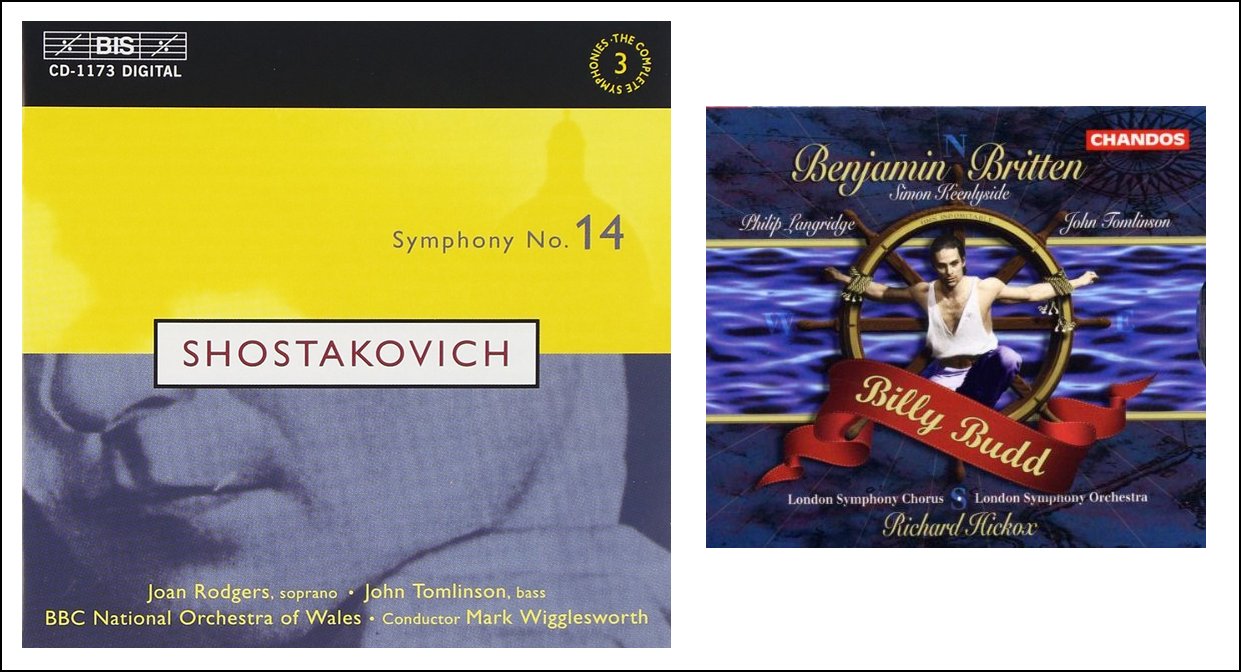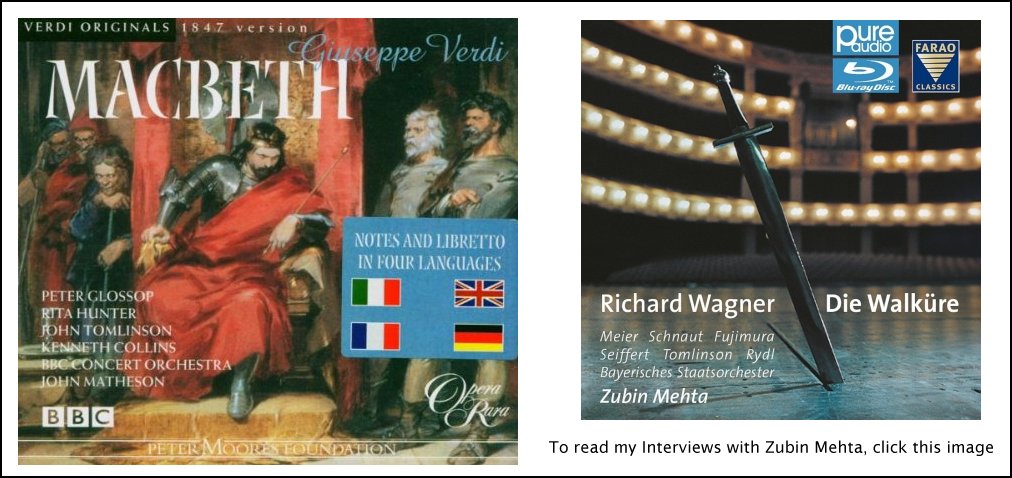Bass Sir John Tomlinson
A Conversation with Bruce Duffie
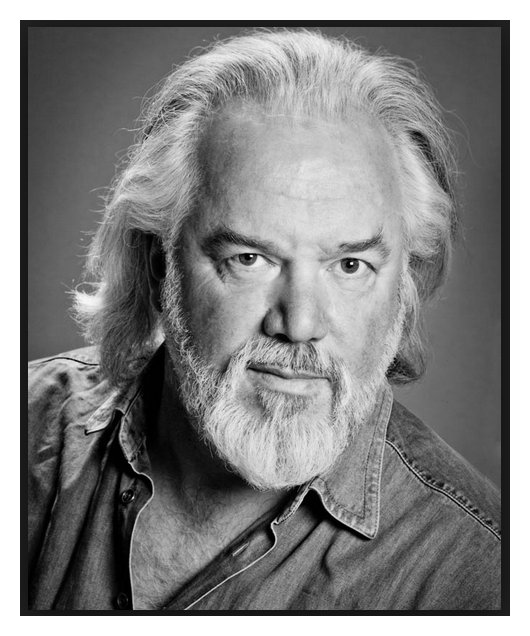
Sir John Rowland Tomlinson, CBE
(born 22 September 1946) is an English bass. He was born in Oswaldtwistle,
Lancashire, England, UK.
Tomlinson trained as a construction engineer before deciding on a career
in opera at age 21. He studied at what was then the Royal Manchester College
of Music (Royal Northern College of Music since 1973), and then with Otakar
Kraus in London. He sings regularly with the Royal Opera and English National
Opera, and has appeared with all the major British opera companies. He has
sung at the Bayreuth Festival in Germany every year from 1988 to 2006, as
Wotan, the Wanderer, King Marke, Titurel, Gurnemanz, Hagen and the Dutchman.
In 2008, he created the title role in Harrison Birtwistle's
opera The Minotaur at the Royal Opera
House [shown in photo below].
Tomlinson was made a Commander of the Order of the British Empire (CBE)
in 1997 for his services to music, and was knighted in the 2005 Queen's Birthday
Honours List.
In 2014 he was awarded the Gold Medal of the Royal Philharmonic Society.
|
When any musician
— but especially a singer — gets to the later part of a successful
career, it is interesting to explore how that particular artist arrived in
such fine condition. Looking back, one can explore or recollect, but
in this instance we have an actual encounter from mid-December of 1991, when
he was forty-five.
John Tomlinson today — a quarter-century later, at his 70th
birthday — is resplendent in all that he is doing.
He was knighted in 2005, so even though this encounter was done prior to
that, I will refer to him on this webpage as Sir John.
We spoke of some of his notable characters, but his insights into singing
and what he says about the details of his career become the gems within the
glory.
Here is our conversation from 1991 . . . . . . . . .
Bruce Duffie: Tell me the
secret of singing Mozart!
Sir John Tomlinson:
Oh gosh, what a question! I’ve just done those recordings with Barenboim of the three
Da Ponte Operas, and I’ve had some criticism because I’m a bass, and some
people prefer a lighter voice doing those roles. But I’ve always loved
singing them and I’ve always loved acting them. They’re great acting
roles because they’re human. Figaro, for instance, is absolutely, totally
human, a many-sided role, a natural role that is wonderful to play in the
theater.
BD: But of course
that’s for the bass rather than the Count, which is a baritone.
Sir John: Yes,
but I just mention that because some people do prefer a baritone for Figaro.
BD: Will you
be singing the role of Don Giovanni?
Sir John: No,
I’m singing Leporello. On these recordings I’m doing Leporello, Don
Alfonso and Figaro, which are the roles that I played in the theater.
But I would like to play Don Giovanni at some stage. I hope that will
come along.
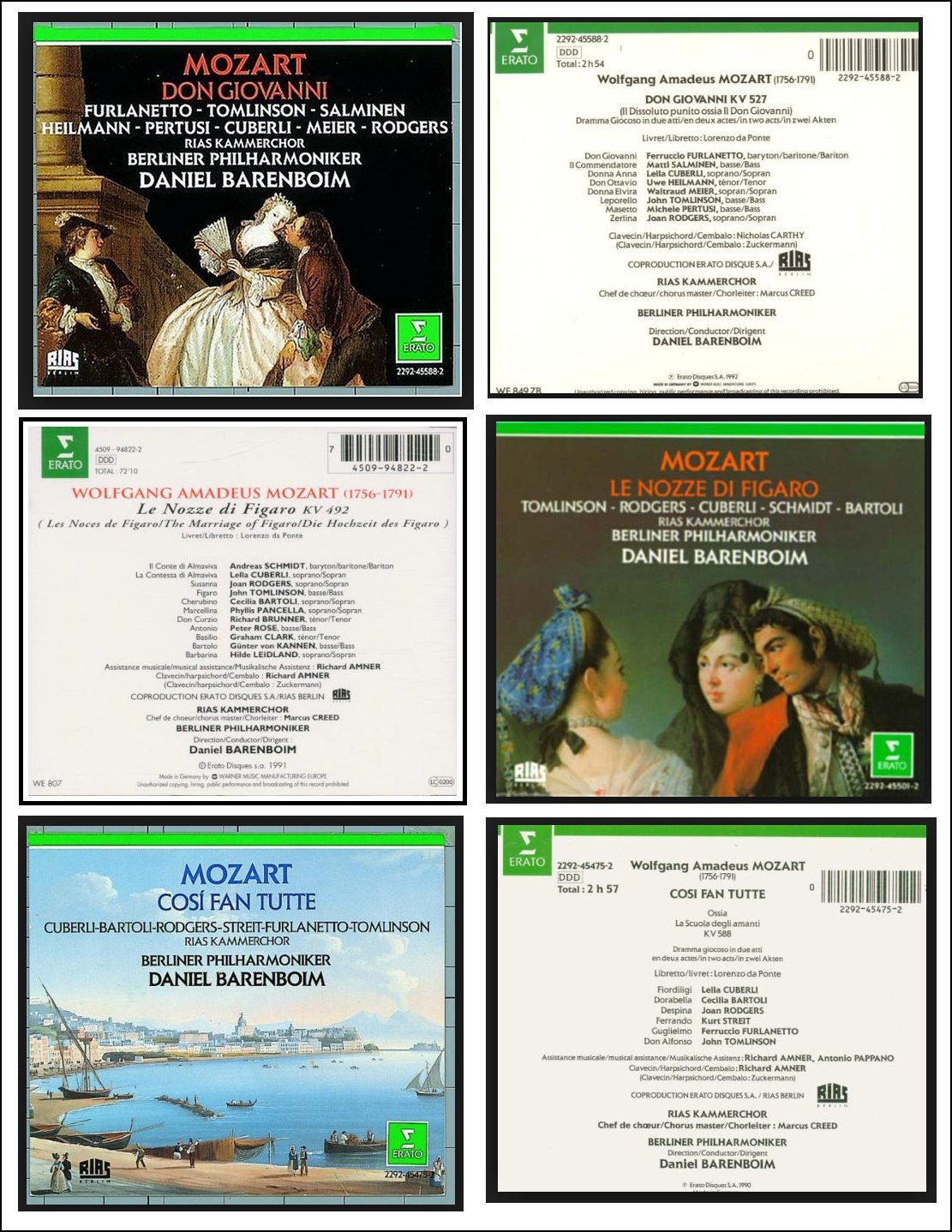
BD: [With a sly
nudge] You’re enough of a rogue?
Sir John: [Laughs]
I think I act enough being a rogue. But when it comes to singing it,
it’s very clean, it’s very precise, and it’s very invigorating to sing.
It’s tremendously satisfying to sing and it’s very healthy to sing.
So I use those arias for warming up often.
BD: Even when
you’re doing Wagner?
Sir John: Even
if I’m doing Wagner I quite often sing a Figaro aria to get going because
you can’t do it the other way round! You couldn’t sing Wotan’s Farewell as a warm-up for singing Figaro.
It would put your voice in the wrong place. But it seems to work preparing
with Mozart and singing Wagner.
BD: Is it that
much lighter, or does it just require the flexibility?
Sir John: It
requires flexibility and it’s more lively, and it’s lighter. All I
can say is that as a singer, my voice does feel in quite a different position
between Wotan and Figaro. The Wagner roles I do find are special, vocally.
They’re different. They demand such a stamina and such strength.
Every note demands core and power, and there’s that absolutely relentless
stamina required in a Wagner role. I find it does set Wagner roles apart.
They feel different. The way you prepare for them is different, and
the way it feels when you’re singing them is different.
BD: Like training
for a mile instead of for a short sprint?
Sir John: Yes,
exactly. The whole feeling is different. If I’m doing Wagner performances
I warm up a lot longer. I get warmed up for a couple of days before,
and do all that sort of thing, whereas with Figaro you could almost just
go on and do it vocally. Not so with Wotan. If you just went
on and did it, you would be in trouble. You really need to build up
that stamina.
BD: So when you’re
doing a Ring, you’re completely immersed
in it throughout the rehearsals and the performances?
Sir John: Yes.
If I can I will take a break. For instance, in Bayreuth the rehearsals
are quite intensive usually to start with, but then when it comes nearer the
performances, there are breaks because the other operas have got to get on
stage. You might do your fresh rehearsals of the Ring in the proper sequence, then there
may be a week off while they’re doing Lohengrin
and Tannhäuser, and Meistersinger, so that you can have two
or three days of complete rest and then you can start singing again.
That’s rather good.
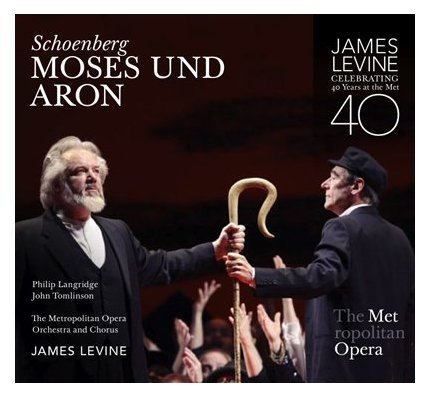 BD: So they look at the Ring as an entity, rather than as four
individual pieces?
BD: So they look at the Ring as an entity, rather than as four
individual pieces?
Sir John: They
do very much so, yes. The dress rehearsals take place as exactly as
the performances.
BD: And then
they start the first performance?
Sir John: Yes,
but woe betide you if you take a long rest before doing a Wagner opera, without
singing, without getting into training before the performance. Even
within two or three days it’s not toned up physically. It is a muscle.
Imagine if you ran a mile a day, and then you stopped running a mile for two
days, it would be fairly hard work when you started running a mile again.
It’s the same feeling.
BD: So on those
days off, you’ve got to run at least half a mile? [Vis-à-vis
the recording shown at left, see my interview with James Levine.]
Sir John: Yes,
exactly. You can stop running completely for two days, but then you’ve
got to run half a mile, and then three-quarters of a mile just to get going
again. This is what I find. A lot of Wagner singers find it is
a physical thing. You’ve got to be in good vocal physical condition.
BD: So you really
are an athlete!
Sir John: That’s
the way it feels, yes. That’s why Wagner is different than other roles.
BD: Is there
anything that comes close to Wagner
— Strauss, or even the late
Verdi? Do you have experience with that?
Sir John: Yes,
I do have experience, and I don’t think there is anything that is comparable.
Possibly some twentieth-century pieces, and I know Strauss is twentieth-century,
but I can’t immediately think of anything comparable.
BD: Mandryka
in Arabella seems to be a little
bit on the length of one of the Wotans.
Sir John: Yes,
I’ve done Ochs. But Ochs is stylistically totally different than most
Wagner roles. It’s so light and fast moving.
BD: Do you go
down to the bottom C in the first act?
Sir John: I usually
manage that. I don’t really have a bottom C. I have a good D,
but the C I have to dredge up from subterranean regions. But I usually
get some sound out.
BD: Being a bass,
rather than doing the Hundings and Hagens and Fasolts, you’re now doing the
Wotans.
Sir John: I have
done the Hundings, Hagens, Fasolts. I began by doing them ten years
ago roughly at the English National Opera.
BD: In English
with Goodall conducting?
Sir John: That
was in English some of the time with Goodall. I studied Hagen at great
length with Goodall in the ‘70s, and did performances of Fasolt and King Mark
in the early ‘80s. In fact, I’ve just done a recording of Hagen with
Bernard Haitink.
I’ve been doing Hagen and Hunding at Covent Garden, and I did them in San
Francisco in their Ring in 1985.
That was really the foundation of my work in Wagner. Wotan came as something
of a surprise actually. [Vis-à-vis the recoridng shwon below,
also see my interviews with Eva Marton.]
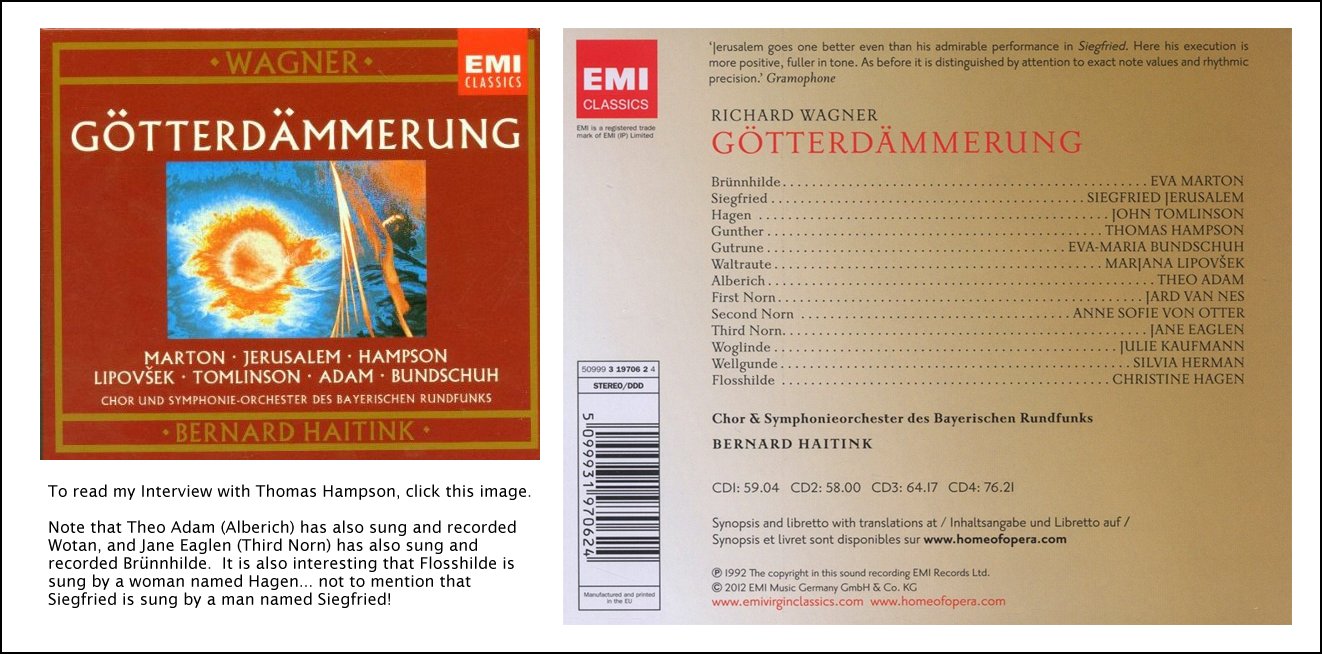
BD: Who asked
you to do it?
Sir John: I was
asked to do it by Barenboim, Harry Kupfer, and Wolfgang Wagner. They
were putting on that new production in ’88 and they wanted a bass Wotan.
BD: Why?
Sir John: Because
I think Daniel wanted a bass color for the role. He wanted a dramatic
voice rather than a baritone voice that finds the top easy, and has to dig
down for the middle and bottom.
BD: How’s your
top?
Sir John: It’s
fine! Of course a bass’s top is more dramatic, bigger, and, it has to
be said, more effortful than a baritone. That’s in the nature of the
voice. It’s a bigger, heavier instrument, but the trump card, as it
were, with the bass singing Wotan is that you always have enough weight.
You always have enough power, and you always have enough projection because
you have by nature a heavier instrument. So the music staff are always
telling you to be quieter rather than be louder! There’s nothing more
wonderful than when you’re doing a Wagner role to be continually being told
you’re too loud. I mean, that’s great!
BD: [With a gentle
nudge] Even over ninety-five guys in the pit trying to cover you?
Sir John: Exactly.
Of course in Bayreuth Wagner carefully designed it so the voice does have
an advantage, more so than in ordinary theaters.
BD: You don’t
get swamped by the sound coming at you?
Sir John: You
do actually. You hear a lot of orchestra on the stage, but the thing
is you know from your experience sitting in the audience that the voices
come over very well. So even though you’re hearing a lot of orchestra,
your conscious mind tells you that you know you’re coming over loud and clear.
You know that for a fact, so you don’t worry.
BD: Then do you
adjust differently when you’re singing at Covent Garden, or the Coliseum,
or at any other opera house?
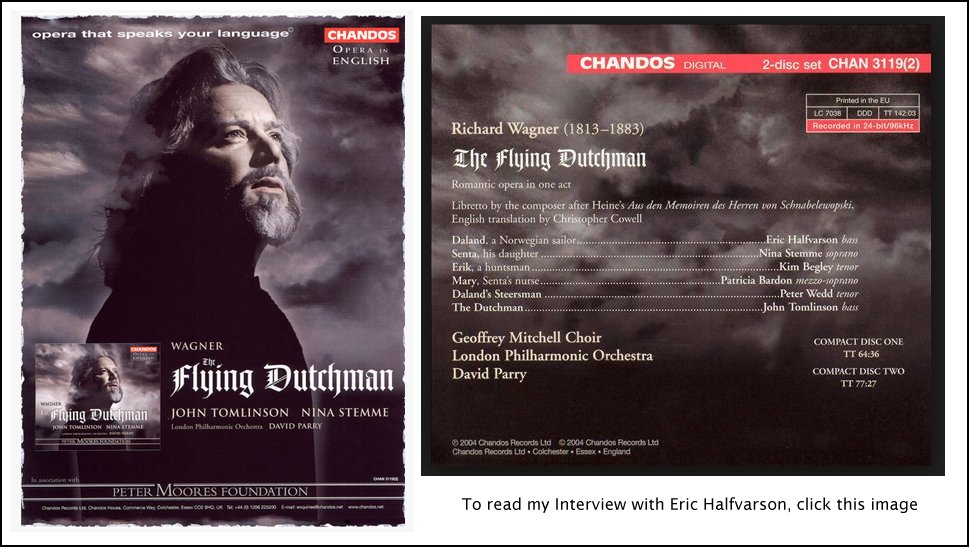
Sir John: I don’t
know if you adjust differently, but the feeling is very different. At
Covent Garden, for instance, you don’t hear so much orchestra when you’re
on the stage, but you know from your experience of being in the audience that
the voices are harder to hear. So you know you have a harder task at
Covent Garden than you do at Bayreuth from that point of view. I suppose
what you tend to do is just to turn the volume up generally a little bit.
You can’t be so controlled. You just have to project a little bit more,
but obviously not too much because if you try and project too much, your
voice gets smaller in fact. If you force or unnaturally try to make
a lot of noise, your voice isn’t working very efficiently, so that’s not
advisable.
*
* * *
*
BD: Do you feel
a different sympathy for Wotan having sung Hagen and Hunding?
Sir John: Wotan
is such a fantastic role compared with Hunding and Hagen. Hagen of course
is a good role, a wonderfully written role, but compared with Wotan, it’s
a cardboard cut-out. It’s a very one-directional character.
BD: He’s just
a simple villain?
Sir John: Well,
it’s not quite as simple as that. He has been programmed to get the
Ring, like those missiles they had in the Gulf War
— the ones that went into
Baghdad, and they knew exactly where they were going, and they could turn
corners almost. You could program them to take out the third building
on Main street, or they would just go and drop down the chimney. When
you’re playing Hagen, it’s a bit like that. Alberich has programmed
in the task.
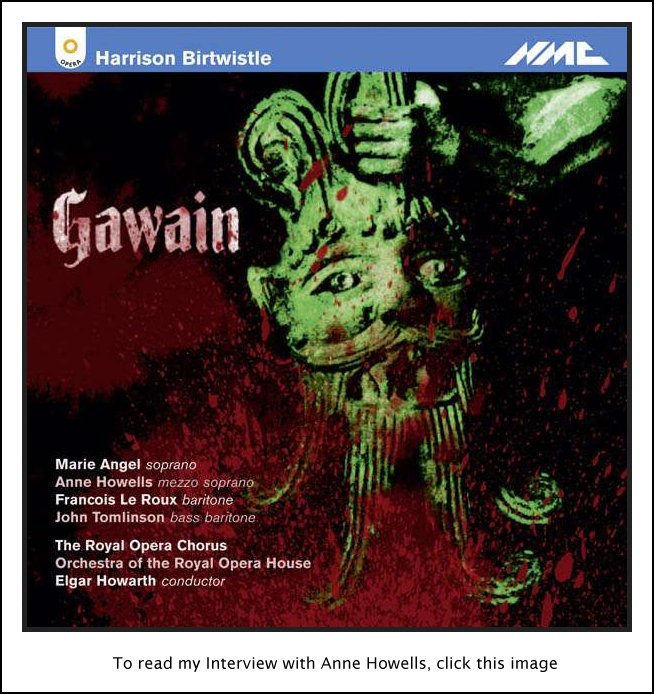 BD: So Hagen has no free will whatsoever?
BD: So Hagen has no free will whatsoever?
Sir John: No,
not really, and he complains about that bitterly. He says, “You
created me like an automaton, and I am miserable. I have no pleasure.
I’m not a man, I’m a machine carrying out a mission.”
BD: Is he a pawn?
Sir John: I think
he is an automaton, really. He tries to have his self-determination.
He says to Alberich, “I’m
getting the ring for me, not for you. I’ll do it for myself.
I promised myself to get it.”
BD: Does he know
in his heart of hearts that that’s not true?
Sir John: I think
he knows that he is just a tool, really.
BD: Does Hagen
have a heart?
Sir John: It’s
tremendously tragic when you play the character. You can’t just say
he’s a simple villain because it’s a pathetic, tragic character to play.
It’s a bit like playing Claggart in Billy
Budd. Everybody who sees it says he’s obviously evil incarnate.
He’s a villain as well, so when you play the part you have to get more inside
it than, “I’m
a bad guy, I’m a horrible person.”
When you get to know it, you realize that there’s far more complexity in
it, and a lot of actors and singers would say that you feel a tremendous sympathy
with the character. When you play Hagen, you feel tremendous sadness
and sympathy for the man who is just like Claggart, who has found himself,
when he is inward looking, really a decayed sad person.
BD: So Hagen
is not evil like Mephistopheles is evil?
Sir John: No,
it’s totally different. Mephistopheles takes this great delight in
his evil. He enjoys it every minute.
BD: And Hagen
is saddled with it?
Sir John: Hagen
is burdened with the task, yes. He is on an evil mission, but it’s destroying
him. It’s eating him up. Like Claggart, it’s eating the character
up. It’s suicidal. There’s a suicidal feeling about the character,
a self-destructive feeling.
BD: So it is
good that Wagner eventually kills Hagen?
Sir John: When
I play Claggart, it’s almost that he goes in there to be killed. There’s
that element in it, just like when Hagen rushes for the ring at the end.
He’s destroying himself.
BD: So he doesn’t
think he has one last shot to get the ring?
Sir John: No.
At the end of the opera, when he says, “Zurück vom Ring”,
I think he just goes headlong. He rushes into the foam with no chance
of getting it.
BD: He’s been
programmed, and that’s what he does?
Sir John: Yes.
He hopes and hopes, right until the body of Siegfried actually recoils when
he goes to take the ring. But then he realizes that if he can’t take
it off the dead body, there’s a difference. You can’t get nearer than
that when even a dead body recoils from you. [Both laugh] I always
play that very big reaction to the body, because he’s absolutely terrified
to think that dead bodies can recoil. But it depends on the production
what actually the body does. In the old days it was the solemn raising
of the arm. These days it tends to be like a dead chicken twitch.
In a couple of productions I’ve done, the body just twitches or rises suddenly
as if there is some electrical charge in the body. It just shorts for
a second.
BD: So it’s a
reaction to rather than a definite purposefulness?
Sir John: You
don’t quite know what it is. It’s like the dead chicken thing
— you chop the head off a
chicken, and it’s still capable of running around a stable yard.
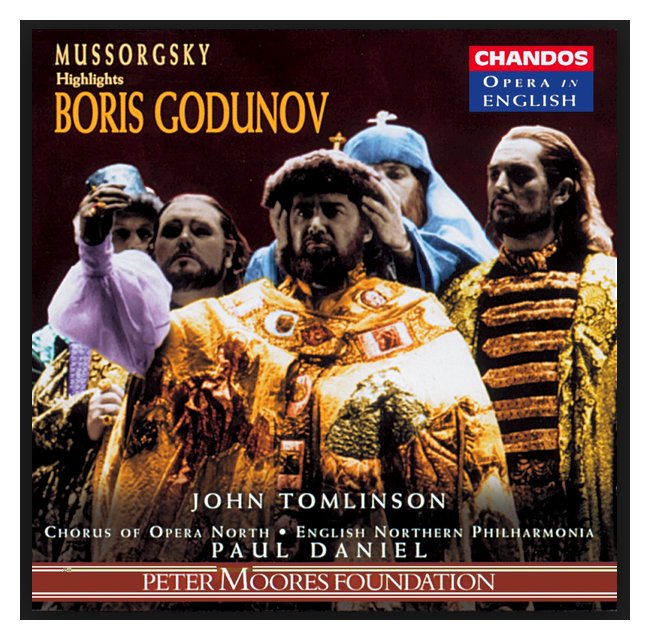 BD: Even though you’re
doing Wotan,
you haven’t retired Hagen from your repertoire?
BD: Even though you’re
doing Wotan,
you haven’t retired Hagen from your repertoire?
Sir John: No,
I haven’t, although probably what will happen is that I will be singing Wotan
for the next perhaps ten years
— this is absolute guess
work — and
then I will retire from the Wotan and go back to the Fasolts, Hundings and
Hagens. I sort of envisage that. I’m forty-five now, so perhaps
when I’m fifty-five, I’ll say farewell, Leb Wohl, to Wotan and retreat a little
bit. As it is, I do feel I have to work at the top of my powers to
really sing the Wotan. There’s no modesty about that. I do a
bloody good job of it. [Quietly laughs]
BD: You wouldn’t
keep getting hired to do it if you weren’t!
Sir John: I’m
very proud of my work, but it’s perhaps something that I’m doing in my peak
years.
BD: Is Wotan
a satisfying role to sing?
Sir John: Oh,
incredibly, yes, wonderful. It’s one of the great roles like Boris
Godunov.
BD: Does he have
free will, or is he like Hagen, programmed to his tasks?
Sir John: No,
he has very much free will, and that’s his problem in that he has as much
free will as we do in that we are given some circumstances, but every minute
of every day we have the power to choose. We can be constructive or
destructive, or we can be loving and considerate, or we can be envious and
greedy.
BD: What is it
that Wotan chooses?
Sir John: In
the Rheingold he makes many mistakes,
based on his desire to accumulate power, lasting, eternal power in the form
of Valhalla and the ring.
BD: So most or
all of his mistakes have happened before we meet him?
Sir John: Yes,
many of them. The mistake with the ring happens during Rheingold because he could have got the
ring as a payment for the Giants, but he wants to keep it for himself.
So that is yet another mistake. But building the Castle is a mistake,
as is simply dreaming of the Castle being built. While he is asleep
dreaming, Alberich is stealing the gold. Perhaps if Wotan had been awake
and more vigilant, perhaps if he’d been a real responsible god, the story
wouldn’t have happened at all because Wotan would have kept his guard; he
would have been the guardian of the world in a proper respectable way, but
he went to sleep. He was dreaming of glory and wealth and power.
BD: For himself?
Sir John: For
himself, and forgetting his duties as a god. The whole thing is that
if you have that power of a god, there comes with it an equal responsibility.
BD: Of course,
that’s true of everyone.
Sir John: Yes,
it’s true of everyone! That’s the wonderful thing about Wotan because
it’s like the conscious thinking part of every person. When you play
the character, you feel like it’s the predicament that every man with abilities,
with talents, with success and responsibilities and duties and burdens finds
himself in. It’s a very human situation.
BD: Is Wotan
a god, or is Wotan human?
Sir John: I’ve
had this discussion with many people because they have seen the Bayreuth production,
which is the main one that I’m been involved in. I’ve done several
performances in other productions, but the one I’m sort of known for is the
Bayreuth production, and in that, Wotan is like a man. He’s very human,
and the production is criticized because Wotan is not sufficiently god-like.
Now to me, the thing about gods is that I believe in God. I believe
that the knowledge that we have of the world and our understanding in the
world is one per cent of the hundred per cent, and I believe that the other
ninety-nine per cent is mysterious and unknown and incomprehensible, and
in the realm of God. But one doesn’t know. People have no idea
what the truth is about God. You can’t understand possibly what is
there.
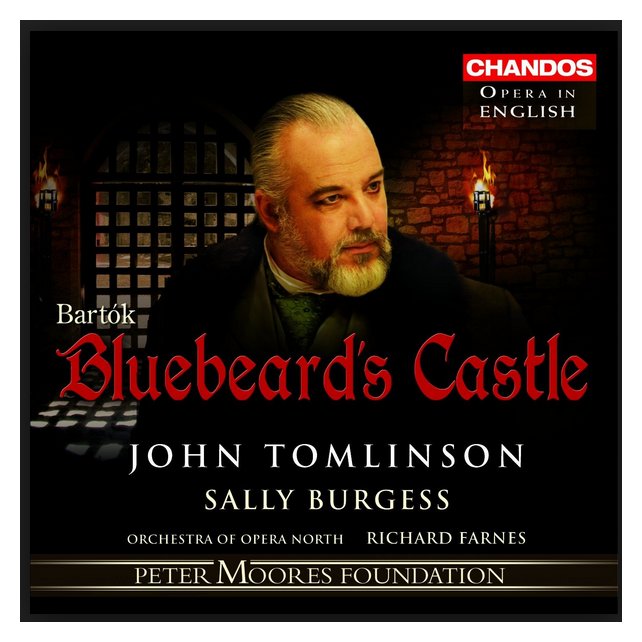 BD: So we’ve having to make a hundred per cent
of our decisions based solely on this one per cent of information?
BD: So we’ve having to make a hundred per cent
of our decisions based solely on this one per cent of information?
Sir John: Yes,
but then with intuition based on the ninety-nine per cent. We don’t
know what’s there, but we create images to explain what we think is there.
So we have gods, just as now I believe in God, and might even think of God
with a white beard on a throne above the clouds. It might be an image
that I have and I might have other images for God. I don’t pretend that
is what is actually there. It’s an image that I have, and that image
is man-made, but the truth of what that image represents is something that
we can’t understand, and which we really believe is there. I
feel I’m getting into deep water here!
[Both laugh] All I’m saying is these images of gods are man-made,
so the character of Wotan is a man-made. Wotan actually existed as
a god going back two thousand years. Before he was booted out by Christianity,
he was a real image that people had, based on themselves.
BD: They figured
there must a same kind of hierarchy on the earth but several steps higher
in the heavens?
Sir John: Yes,
like the Greek gods. In a Monteverdi opera, when Jupiter comes down
from Heaven he behaves just like you or I. He has all the same faults
and all the same selfishness and stupidities and failings that we have!
BD: You’d think
that a god would be perfect... or if there is just one God, you’d think that
God would be perfect.
Sir John: Yes,
but the images that man has made for gods have not been perfect. Even
Jehovah was far from perfect. He would just issue boils. He would
just send raging plagues of boils, for instance, on Job because he was good
man and he thought he’d test him! That’s not a thing that any self-respecting
person would do! [Both have a huge laugh]
BD: So let us
turn this back around to Wagner again!
Sir John: That’s
right. All I’m saying is that to me a god is very human. He is
like an expression of the human condition, and I feel very much that that’s
what Wotan is. I don’t feel that I should apologize for making Wotan
human because to me it is a bit boring. It’s boring to play a character
really remotely distant and blank, and say that’s because it’s god-like.
Obviously it’s possible to play the traditional Wotan remotely but with tremendous
grandeur, and tremendous insight, and tremendous power. I’m not saying
that’s not possible.
BD: But perhaps
that spoke to a previous generation of audience. As the audience-view
changes, as we go through wars and evolve our own spirit globally, then perhaps
we evolve our spirits and our visions of what gods are.
Sir John: Yes,
I think that’s true. Whether it really has changed for good, I don’t
know with a character like Wotan. Whether the old Wotan could still
be a totally convincing character, I don’t know. I might end up playing
it like that myself one day.
BD: But I would
think Wagner himself would be the first one to cheer on evolution of his characters.
Sir John: I think
so. But what that production in Bayreuth did
— even though some people
have complained about this over-human aspect of the gods
— is that it brought out
the vivid characters of the gods; the many-sided intricate, subtle, fascinating
characters that the gods have, and the relationships between them.
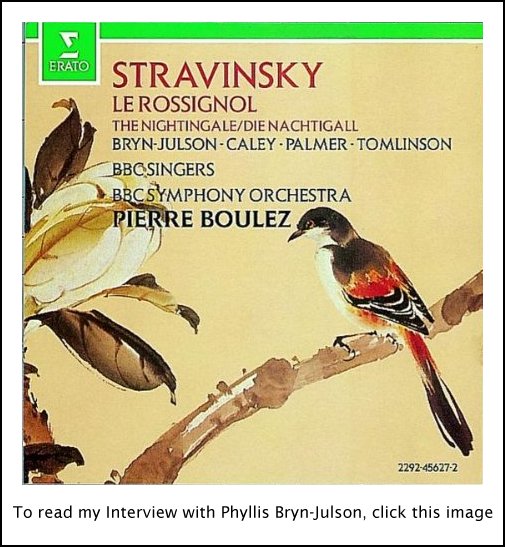 BD: Were Wotan and Fricka ever happy?
BD: Were Wotan and Fricka ever happy?
Sir John: Yes,
I think so. I think they were very happy at one time.
BD: Could they
be happy again?
Sir John: No!
BD: [Laughs]
It’s through!
Sir John: I think
it’s through, and there’s this nostalgia that they were happy, and that there
is still a love between them and their mutual caring. But too much has
happened to force them apart. I think they’ve had it.
BD: Is it too
bad that they couldn’t divorce. [Vis-à vis the recording
shown at right, see my interviews with Felicity Palmer,
and Pierre Boulez.]
Sir John: Being
gods they couldn’t because Fricka stands for non-divorce. Her very existence
represents marriage, so it would be instant death. It would be instant
destruction. If she divorced, in operatic mythological terms she would
just disappear into thin air. She wouldn’t exist anymore because she
would not represent it. That’s why Wotan, who represents order and
rule and law, cannot break the rule, cannot break the law, cannot break his
promises. That’s fundamental to the character, and that’s why he ends
up in all this trouble.
BD: At the end
of Rheingold, does he really think
that it will be Siegmund who will grab the ring, or does he know that it will
have to go another generation?
Sir John: [Ponders
a moment] That’s a very interesting question because most people don’t
even think at the end of Rheingold
that Wotan’s got a thought in his head. Well, some people do but...
BD: He picks
up the sword, and we know he’s going to plunge it into the tree in Hunding’s
hut.
Sir John: We
know Wotan at that moment where the music changes. We go from that
absolute total depression when Fasolt’s murdered and Wotan sees the curse
on the ring. He sees Fafner go off with the ring to hold it as a threat
to the world. As long as the ring’s hanging about, the world’s not
safe, and Wotan at that time is in his absolute abject depression.
But five minutes later, in a typical Wotan fashion, he has these wonderful
ideas of inspiration. He’s talking about going to seek out Erda again,
and that’s how Brünnhilde is born. He’s thinking about converting
Valhalla into a place for heroes, to build up an army to fight Alberich,
and he also has the idea of the Wälsungs
and Siegmund. The sword theme then doesn’t particularly mean the sword,
it means the Wälsungs’ spirit.
BD: In one of
the analyses I read, they called the little motif there ‘the purpose of the
sword.’
Sir John: Yes,
because the Sword and the Wälsungs
are very bound up. You don’t know quite which came first.
BD: The Wälsungs then are supposed to have
their own free will, divorced completely from Wotan, and not be part of his
spirit. But they are part of his flesh really.
Sir John: Yes.
They’re doing what he cannot do, supposedly.
BD: So now we
come back to my question. Does he think it will be Siegmund who will
rescue the ring, or does he realize it will have to go another generation?
Sir John: I suppose
he thinks it will be Siegmund. I don’t know... I’m not sure. At
the end of Rheingold he has this
great idea that he will create humans with free will who will do what he,
as a god, cannot do, but I’m not sure that it goes any further than that.
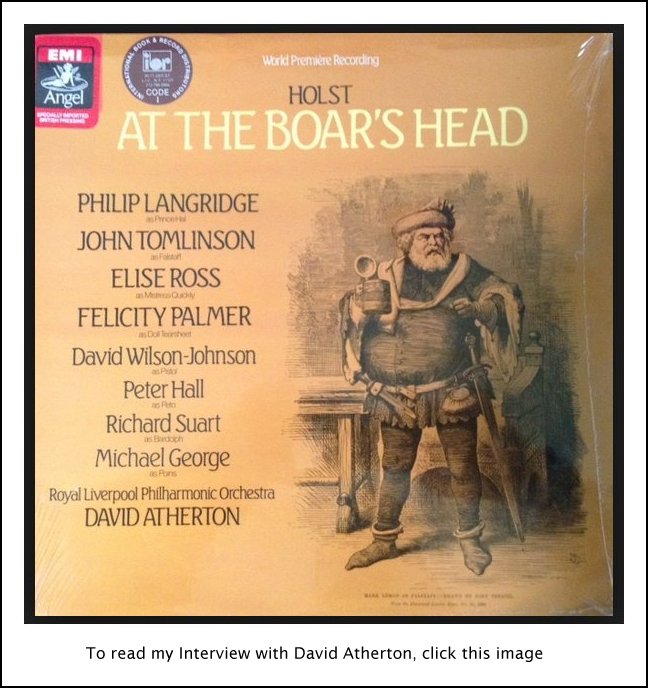 BD: So he hasn’t reasoned it all out yet?
BD: So he hasn’t reasoned it all out yet?
Sir John: No.
He just has this great idea, which is a wonderful idea!
BD: Which doesn’t
quite work though...
Sir John: Well,
it works. Siegfried gets the ring. With Brünnhilde they get
it back to the Rhine, so it works. It does work, but at the cost of
everything. But that’s important that it does work. Wotan is
planning for that. The whole of those plans is to get the ring to get
it back into the Rhine, and he does succeed.
BD: So if Wotan
did learn something, and if he had gotten the ring back himself, he would
not have kept it? He would have taken it and given it back to the Rhine
himself?
Sir John: I’m
sure he would, yes. Wotan learns tremendously throughout the piece.
To me, in Rheingold he’s a real yuppie
rogue. He is unscrupulous in the way he deals with Alberich and the
ring. It’s absolutely ruthless.
BD: He just swipes
it!
Sir John: Just
for his own greed, absolutely for his own power, his own greed, his own ego.
He forgets all his responsibilities to the world. By the time you get
to Siegfried, you have a man of tremendous
wisdom who is really planning his own sacrifice to save the world almost.
To me, he takes on tremendously heroic stature and power as it goes along.
I’m sure if he’d come across the ring in Walküre or Siegfried, he would have immediately sent
it back to the Rhine. If only it were as easy as that!
BD: It’s a pity
he can’t go back to Brünnhilde and see who has the ring.
Sir John: Well
he does in the form of Waltraute!
BD: At that point,
Siegfried has the ring when he comes out of the cave. But Wotan sees
the ring one last time when Siegfried has it in the third act of Siegfried in that confrontation scene.
Sir John: He
does see it again, yes.
BD: It’s a pity
he can’t take it at that point.
Sir John: Now
let me just think about this! [Pauses]
BD: It’s a pity
he couldn’t reason with Siegfried, and either con or charm him out of the
ring.
Sir John: [Continues
to think] Hmmm... I’ve never thought about that! [Roars
of laughter all around] But by that time the plan has developed.
You’ve the banishment of Brünnhilde. Just like the wonderful idea
he had at the end of Rheingold, there’s
the wonderful ideas at the end of Walküre.
This is the brilliance of a great opera composer, isn’t it? You end
the evening with incredible inspiration.
BD: And looking
ahead, too?
Sir John: Yes.
Wotan, with the ‘Leb Wohl’, is more
about the inspiration of the idea of Siegfried being born, and discovering
Brünnhilde. He will be the one who discovers Brünnhilde, and
together they can save the world. That’s why the music of the ‘Leb Wohl’ is so ecstatic at the beginning
to me. It’s absolute ecstasy. It’s not a sad farewell at that
point because Brünnhilde has just told him Siegfried’s in embryo.
That’s what unleashes the inspiration of the ‘Leb Wohl’. He pretends not to be
moved by it at the time. Just like we do as fathers or parents or husbands,
we’re very good actors, aren’t we? We are told something, and we don’t
give in. We pretend we haven’t been impressed.
BD: We wait for
it to impress us completely?
Sir John: I actually
think he’s been profoundly impressed, yes. Then she goes further and
says, “You
could make a fire so that only this embryo could discover me, and then there’s
a chance we can accomplish everything that you’ve wanted to accomplish!”
So I think there’s tremendous inspiration in there. At the very end
he says, “Yes,
and I’ll go even one step more. He has to face my spear as well.
If he’s going to do my job for me, he has to break me as well; he has to destroy
me.”
That’s a tremendously reckless, self- destructive thing that he’s saying.
BD: Is he making
another wager like when he lost the eye?
 Sir John: [Hesitates]
I don’t see it like that. He’s seeing his own death, and he’s going
for it heroically. Of course in typical Wotanesque fashion, he’s not
absolutely rational and calm about it.
Sir John: [Hesitates]
I don’t see it like that. He’s seeing his own death, and he’s going
for it heroically. Of course in typical Wotanesque fashion, he’s not
absolutely rational and calm about it.
BD: Would he
be happy for himself to perish and not the rest of the world? Or does
he want the whole destruction?
Sir John: That’s
what happens, isn’t it? He does perish, and whether the world is saved
or not, we don’t know really.
BD: So how do
you see the last two minutes of Götterdämmerung
after the fire is out?
Sir John: Everything
that was is destroyed. Civilization is destroyed, as it were.
BD: Then what
comes out of that?
Sir John: A new
civilization!
BD: Fully formed,
or embryonic?
Sir John: I think
in an embryonic state. The whole thing starts again.
BD: For good
or bad?
Sir John: For
the mixture of good and bad that is in the story.
BD: Are we going
to get another Alberich and Wotan in the next go-round?
Sir John: Yes,
we are. Whether
you call those good or not is another question.
BD: [In a state
of mock-panic] So we are condemned to repeat the whole damn thing again???
Sir John: [Laughs]
I think so, yes. Wotan is really man’s consciousness. It’s what
makes us different from horses. As soon as we can learn, and as soon
as we have the intelligence and the knowledge and the choice...
BD: And reason?
Sir John: And
reason, yes, then we are Wotans taking off that the branch of knowledge of
the tree, and we are making decisions and we are forming rules, and we are
making civilization. We’re becoming civilized.
BD: So all we
can hope is that this time we’ll do it a little better?
Sir John: The
reason I love the character of Wotan so much is that he strives and strives.
I think that’s what we must do. The human spirit strives to make it
better all the time, but unfortunately we tend to reap as much havoc as we
do. I think The Ring is a wonderful
myth. Some people say that Wagner made a mess of the old legends, but
I think he brought them together in a wonderful way.
BD: Is this why
it works so well because no matter how much you think about or talk about
it, you never get to the bottom of it?
Sir John: Yes.
The Ring is absolutely true to life.
When we’re on our death beds we’ll be a little like Wotan sitting up there
on the throne. We won’t really know what it was all about. It’s
like Wotan with Erda in the scene of Siegfried.
He asks her what it was all for. “Why
was I created? Why have I had to strive like crazy all these years
to try and cure something of which I was the cause?”
BD: Maybe when
we pass through the door of death, the answer to that question becomes apparent.
Sir John: Hopefully!
[Both have a huge laugh]
BD: My own myth
about life and death is that after death we immediately understand.
We walk in and everything is there, and the understanding is zapped into our
consciousness... or whatever consciousness we have then.
Sir John: Well,
we certainly don’t understand now, do we? [More laughter]
*
* * *
*
BD: Do you sing
differently in the concert hall and the opera house than when you’re making
a recording?
Sir John: Gosh!
When I’m making a recording I really try to bring as much character in as
I do in the opera house. When recordings are made I notice that we tend
to get more clinical and colder and more precise. We just want to get
the thing really perfect, and we lose the character, the live nature, the
spontaneous nature of the theater. So when I make a recording, I just
try and keep that at all costs, even if it means that I might not even be
as accurate as I could be. Obviously, one is not deliberately inaccurate.
I just made a recording today of the Cantata
Profana of Bartók, and the character I play is a father, pleading
with his sons, who have been transformed into stags, to come home because
the mother is waiting for them. All the tables are set for a family
meal, but the stags are saying, “No,
we’re destined to roam the forest forever. We’ll never come home again.”
So there’s a pleading feeling about everything that I sing, and I really
try to hold onto that even though when I went to listen, part of me says,
no, it should be more precise, it should be more clinical. Part of my
perfectionist tendencies want that, but I fight that a bit and say, “No,
come on, be the character.”
That’s what it’s about, as well as accuracy. It’s also about character,
so I try to keep that, but it’s always a battle.
BD: Would it
be good if you could have both the character and the accuracy?
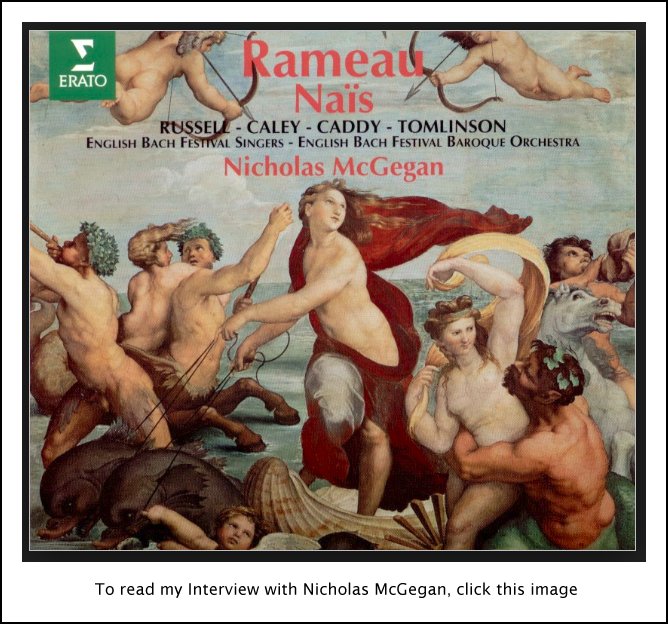 Sir John: That sounds
easy, doesn’t it?
Sir John: That sounds
easy, doesn’t it?
BD: [With mock
bravado] Oh, sure, it should happen every time? [Laughs]
Sir John: [Calmly]
You think it should?
BD: I assume
that’s what you strive for.
Sir John: Yes,
you do strive, obviously, but it’s very complicated. You strive to have
a technique that is so good that you can do musically or character-wise whatever
you want, and still make a beautiful noise and be on the right note and everything.
Of course, that’s what technique’s all about, but there is a conflict.
All I know is that it’s easy to sing the right notes if you’re cold and uninterested
in the part. If you’re into the part and you’re singing the right notes
as far as possible... Let’s take Wotan again. I sing every note
in the role, but there is a balance there. There are sacrifices that
you make. If something is that absolutely clinically precise, it is
often totally boring, but here we are really getting into the mystery of
musical interpretation. I’m not suggesting to anybody to sing wrong
notes. I’m saying that notes should be sung beautifully and with a
beautiful line and beautiful voice and all that, of course. It’s a
puzzle as to whether it can be attained. You’re right, you should have
both, but there’s a mystery there.
BD: Are you pleased
with the way the recording came out today?
Sir John: I think
so. It’s always hard to tell. When you listen in the room, it
is still unformed. They have taken various tracks and you’re not hearing
the proper balance, usually, so what you have to do is to listen to your contribution
in a very critical way.
BD: And then
trust?
Sir John: Yes,
and trust. There’s a lot of trust involved. You can’t expect
to go in the room and hear it as you would hear the finished record because
there still is some balancing up to be done. So your personal responsibility
is to be sure that your own contribution was to your satisfaction, and I think
it was.
BD: How do you
divide your career between staged operas and concert works?
Sir John: It’s
even more complicated than that because you end up with recordings as well.
You have total new productions of operas, which involve many weeks of rehearsal
and which are tremendously satisfying to do, but take up a lot of time.
You have operas which are done with very little rehearsals some times.
BD: Just thrown
on?
Sir John: Yes,
thrown on. Often it is a role that you know well, or perhaps a role
which is very static, and it is comparatively easy to do that sometimes.
It is not to be recommended, but that happens in many opera houses in the
world. So I spend, I suppose, twenty per cent of my time doing performances
with very short rehearsal time. Then there are concerts, which of course
is different. Then there are recordings, which take up quite a lot of
time. Regrettably, it is possible for me to go for several months without
doing a new production, without doing a fresh, absolutely freshly-rehearsed
new production, and I miss that very much. So I really try and avoid
that absence of new productions because that’s where you get your inspiration
with working with people for several weeks. That’s where you really
break new ground. Just going and singing a hastily-rehearsed production
gets the adrenaline going, and you might do a very, very good performance,
but you know it is just a one-off. That does happen quite a lot, actually,
but it’s not constructive to your own art.
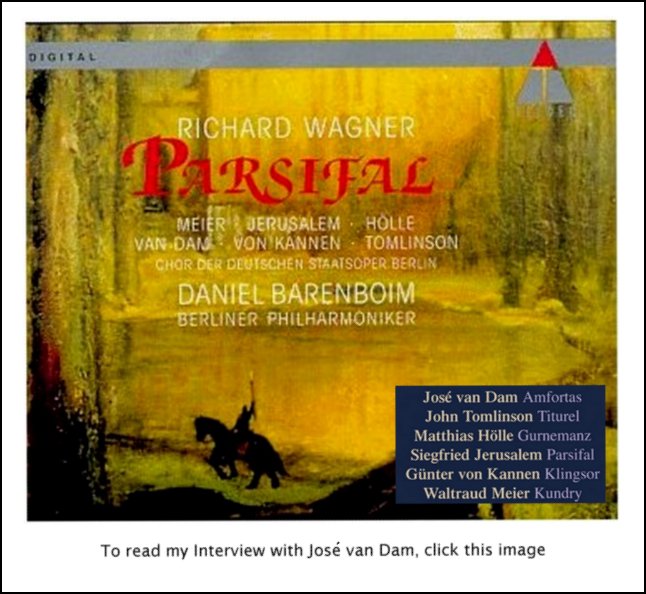 BD: How do you select
which new roles you will learn?
BD: How do you select
which new roles you will learn?
Sir John: [Hesitates
a moment] It rather depends on what you are invited to do
— at least that’s the way my
career has gone.
BD: So the Wotan
was thrust upon you almost unbeknownst?
Sir John: I was
invited to do the Wotan. The people I mentioned before asked me to look
at the Wotan, and it was something that I thought I wouldn’t do. But
I looked at it very seriously. I learned an act and I sang it quite
a lot. I sang it with coaches and for various people before making the
decision, because that’s a very big decision.
BD: Can you do
this with every role that you’re asked to do?
Sir John: No.
Some are more straightforward. I’m learning Gurnemanz at the moment.
I’ve been asked again by Daniel Barenboim and Harry Kupfer to do Gurnemanz
in Berlin, at the Staatsoper next autumn. So I’m in the process of learning
that role.
BD: Having done
Titurel previously?
Sir John: Yes,
but of course I don’t have any doubts about Gurnemanz because I can comfortably
encompass it vocally, and there will be no problem with stamina. There
will also be no problem basically with the character. Certain people
are particularly well-suited for certain roles, and I don’t know exactly how
I’m going to be fitted into that role. It might be absolutely incredibly
brilliant, or it may be good but that’s all. You can’t say until you’ve
done some performances, but I didn’t need to think much before saying yes
to that invitation because I knew that I could do it well.
BD: So then it
was just making sure you had the time cleared?
Sir John: Yes,
because these roles take so long to learn. If you learn them well, you
start with the text. I play the piano, so I play harmonies and slowly
get into the role without listening to recordings. That’s the best
for me. That’s definitely the best way. I will listen to recordings
later, when I know it.
BD: To see what
they do rather than to prompt you?
Sir John: Yes,
but even then only once. Even then I will only listen to a recording
once because the gremlins, or whatever you call them, the little idiosyncrasies
that other artists have can very easily get into your system.
BD: You want
your own quirks?
Sir John: Yes,
and it’s always more satisfying when you’ve learned it totally by yourself
— obviously with coaches.
BD: Then the
conductor can mold you?
Sir John: Yes,
exactly. With Barenboim we have a very good relationship, and we will
work a lot together. He is a conductor that works hard with singers.
BD: Was it at
all difficult or interesting or surprising to do Wotan with him and then
do the Mozart operas with him?
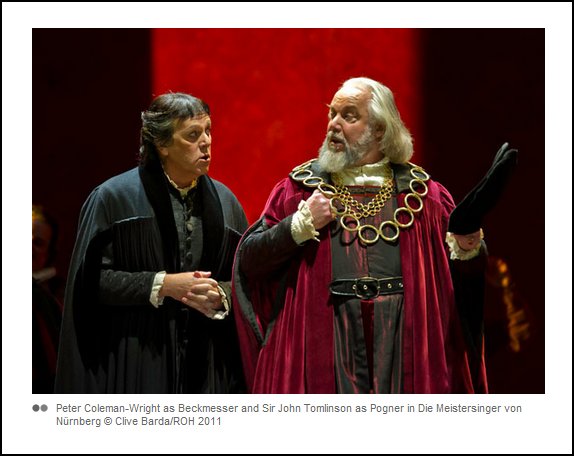 Sir John: I don’t think
there were any surprises because he was tremendously inspirational in both.
Sir John: I don’t think
there were any surprises because he was tremendously inspirational in both.
BD: In a different way?
Sir John: Oh,
in a totally different way! The Mozarts he had done a lot before he
came to the Ring. I think
the Ring he did for the first time
in 1988, the same year that I started my Wotans.
BD: But you had
been involved in Rings before that,
so were you more immersed in the style?
Sir John: I don’t
know. He has conducted other Wagner operas. But just going back
to what we said before about making decision, I’ve also been asked to do Hans
Sachs, so I’m at the early stages of preparing that. I have these two
big projects at the moment
— the Gurnemanz and the Sachs
— which take months.
BD: Have you
done Pogner?
Sir John: Yes,
I have [shown in photo at right].
Sachs, of course, was a bigger decision, but I learned sections of the Sachs
and I sang those quite a bit, and I made the decision that I thought I could
do it. They’re big decisions, and in a way the truth is you don’t really
know until after the opening night whether you can do it... and when I say
‘do it’, I don’t mean getting away with it.
BD: Doing it
to your level?
Sir John: Yes,
doing it to your level. I remember I was delighted with the Wotan when,
at the end of Walküre in the
first performance, I was there for the Farewell
and was in good voice. I was physically tired, but totally on top of
the situation. I was delighted, but almost before that moment, you
wondered whether or not with the pressure of performance you actually had
it in you to do it physically. Some people can do these things, other
people can’t. There are some good singers who just can’t do certain
roles. They’re just not meant physically to do them. They just
haven’t got the strength, the physical stamina, or whatever, required.
*
* * *
*
BD: Do you also
do some Italian roles, or are you basically into the Mozart/Wagner fach?
Sir John: No,
I’ve always tried to have a really wide variety of roles, and that worked
for awhile. The first roles I did were in I think 1971 and the ’72
Glyndebourne Touring Opera. So I’ve been around for twenty years.
It doesn’t feel like that, but it’s true, and in that time I’ve done a wide
variety of repertoire. I’ve loved doing that. Now that I’m more
known for the Wagner, it’s getting more difficult to keep my repertoire as
wide as it was before. But I’m still trying to do that. I love
singing Verdi and I love singing Handel, for instance.
BD: [Offering
a helpful suggestion] If they offer you a Wotan, say you’ll do the
Wotan if you can do Philip II.
Sir John: That
is a sort of power that comes with noticing the roles not many people can
do. You can actually make terms. I haven’t done very much of that
yet, but I will.
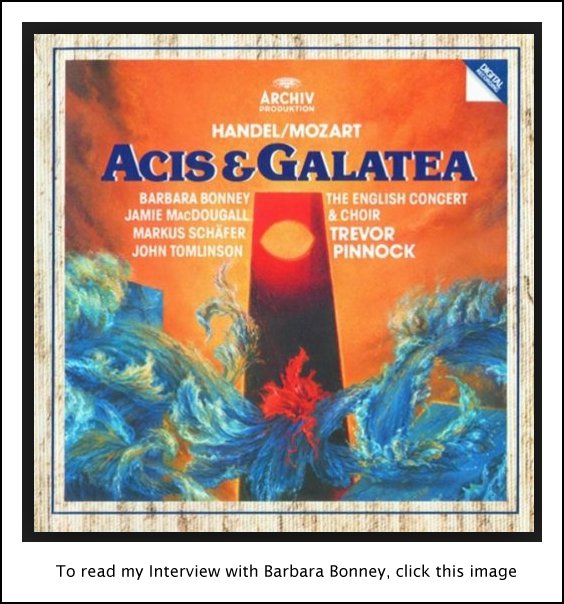 BD: What other recordings
are coming along soon?
BD: What other recordings
are coming along soon?
Sir John: Well,
I’ve just done the Hagen with Bernard Haitink.
BD: Will you
be recording Wotan?
Sir John: In
Bayreuth we’re doing a video recording of the whole Ring. Last year we did Rheingold and Götterdämmerung. Wotan
actually makes an appearance in Götterdämmerung,
so I was actually there. This coming year is a hard year for me.
We did Walküre and Siegfried video recordings. I think
probably those are strictly video recordings, but I’m not sure. It’s
a very vigorous production and there’s quite a bit of noise, and I’m not sure
whether that will be acceptable just on a sound recording. Of course,
it’s very important doing the video recordings. I’ve been invited, actually,
but I don’t think I’m involved in any [purely audio] recording of the Ring, apart from that as Wotan.
The last one of the Mozarts will be coming out
— the Don Giovanni in which I sing Leporello,
and I’m still doing some Handel. I did a recording two or three months
ago of Acis and Galatea with Trevor
Pinnock, and I have a CD of Stravinsky that I did with Esa-Pekka Salonen.
I’ve also done some Stravinsky with Boulez so I do have quite a wide range.
I enjoy twentieth-century music too, but of course you can’t do everything.
The problem is you’re human.
BD: Would you
do everything if you could?
Sir John: Yes,
I would! [Both laugh] If I could comfortably, I think I would
try and encompass the whole range
— not through any greed,
but just because it’s great to sing Wagner one month, have a week off, and
then do some Handel or something. Of course you can’t do them alternate
nights or anything stupid like that, but it’s tremendously refreshing in both
directions — to
go from Wagner to Mozart, and then Mozart back to Wagner. It’s wonderful.
Variety is the spice of the career, really. It really makes the career
enjoyable.
BD: Do you like
the life of a wandering minstrel?
Sir John: Well,
it has personal problems. That’s the one drawback in this career.
I’m happily married, and I have three children, so it’s not easy, and it’s
not fair in many ways on my wife. I feel as if I have put quite a burden
on her over the years. I haven’t been fair, really, and that’s the truth
of it. But that’s the one big problem of our business. You can’t
keep singing in the same opera house week in week out for ever because your
own art would get stale. People would get fed up of you, and it depends
on moving around. It’s part of the overall needs of the artist.
BD: Are audiences
different from city to city, and country to country?
Sir John: Yes,
they are, very much so. They vary in a city even on the days of the
week. Friday night audiences are a particular sort, and Sunday afternoon
is another sort, and they certainly vary from country to country.
BD: Do you take
this into account in your performance?
Sir John: It
creeps in. The sort of audience you know you are going to get does
tend to affect the way you prepare, I’m afraid. I don’t know if that’s
a good thing or a bad thing.
BD: It’s
just
a thing!
Sir John: I’m
just trying to give some examples of that. A very basic example is
if you know that the audience are going to understand everything you’re singing
about. If it’s in their language
— say, Bayreuth in German
— you know eighty per cent
of the audience are going to understand every word. That affects the way you
act on stage. Perhaps it shouldn’t, but if you know the audience are
going to understand, you are not so demonstrative in your actions.
BD: You can be
a bit more subtle?
Sir John: Yes.
It’s bit different now with supertitles. That introduces yet another
complexity. In the old days when it was either a foreign language or
English, it very much affected the way you played a part. For instance,
if you were playing Leporello, you could be very still. Just the way
you delivered the words would bring the house down. In Italian, of course,
you didn’t bring the house down at all unless you were getting up to some
of their other tricks or pranks as it were. So the original language
tends to make it a bit more hammy if you’re performing to people who don’t
understand. Now with supertitles, I’m not sure quite where we are.
Let’s
take laughter as being the most obvious response. It’s
getting even more complicated because a line will be coming up, the audience
will see it and laugh! Then you will deliver the line, and if you’re
good at it you’ll get another laugh. On the other hand, it can work
against you. Sometimes, if the audience responds to the line, you still
have the embarrassing task of going through with the line. Sometimes
it’s taken away the punch line, as it were. It’s taken away the crucial
moment.
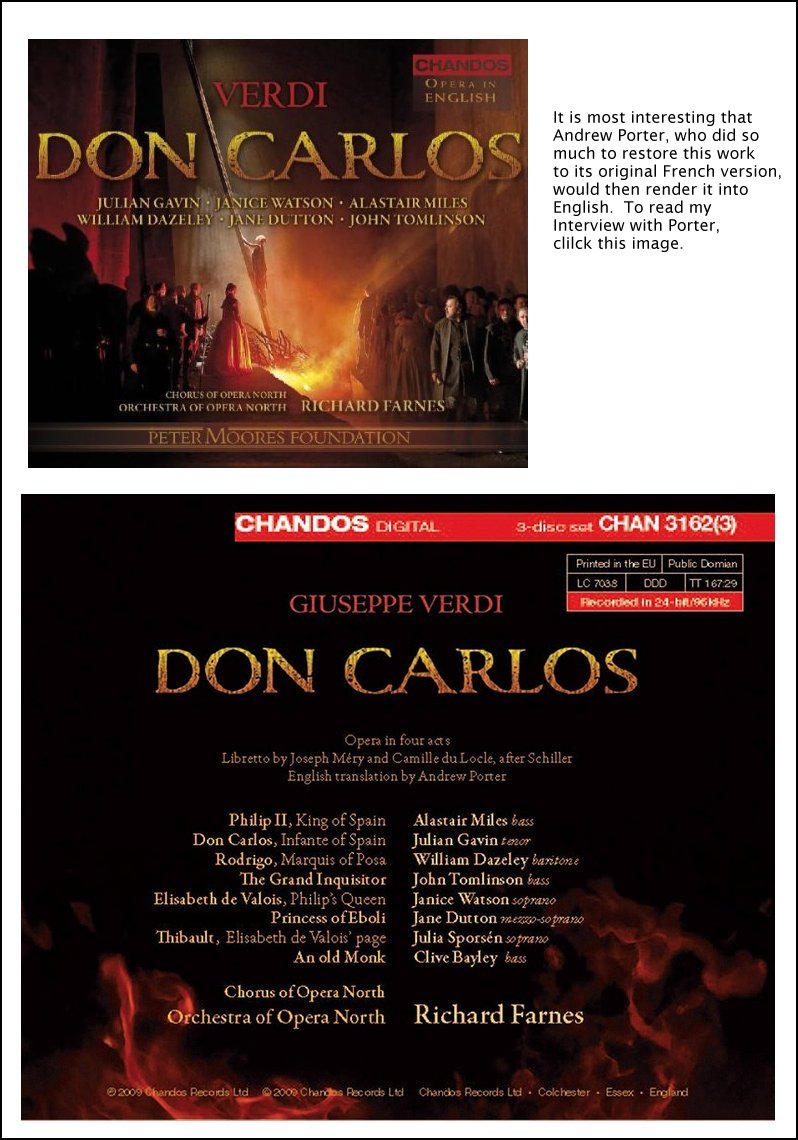
BD: Despite all
the trials and tribulations, is singing fun?
Sir John: [Hesitates
a moment] Acting is fun. Singing is a serious business.
BD: Too serious?
Sir John: [Thinks
another moment] I suppose it’s serious, but I don’t know if it’s too
serious. One thing is that’s what we’re up there to do, and we’ve got
to be very good at it or else we shouldn’t be up there. So there’s a
continual tremendous responsibility to sing well. You work perpetually
to give good vocal performances, so that I do regard that as almost a responsibility.
When it comes to the interpretation and the acting
— getting into the character
and giving a performance
— that
can be great fun, even with a serious character. It can be pleasurable,
but very satisfying and very rewarding.
BD: Have you
done song recitals too?
Sir John: No,
I don’t. I would like to but it’s one thing that I never seem to have
time to do. I haven’t yet got into it. To put in the initial work,
to build up initial programs, it’s simply quite a big investment. If
you’re learning Gurnemanz and Hans Sachs, you don’t have time also to learn
Winterreise. But I would love
to do that at some stage.
BD: Thank you
for coming to Chicago. I appreciate it, and thank you for letting me
interrupt the last part of your day!
Sir John: [Laughs]
Oh, it’s a pleasure.
Below are a few more of the recordings
made by Sir John Tomlinson.
Besides those shown on this webpage, he recorded some small roles early
in his career, including four with Dame Joan Sutherland
and Richard Bonynge,
(Hamlet, Le Roi de Lahore, La Sonnambula, and La Traviata), as well as
Tosca (with Freni & Pavarotti) and
Manon Lescaut (with Freni & Domingo).
For more photos and a complete list of his recordings, visit his official website.
© 1991 Bruce Duffie
This conversation was recorded in Chicago on December 16, 1991.
Portions were broadcast on WNIB in 1999. This transcription was made
in 2016, and posted on this website at that time. My
thanks to British soprano Una Barry for her
help in preparing this website presentation.
To see a full list (with links) of interviews which have been transcribed
and posted on this website, click here. To
read my thoughts on editing these interviews
for print, as well as a few other interesting observations,
click here.
* * * *
*
Award -
winning broadcaster Bruce Duffie was
with WNIB,
Classical 97
in Chicago from 1975 until its final moment
as a classical station in February
of 2001. His interviews have also appeared
in various magazines and journals since 1980,
and he now continues his broadcast series on WNUR-FM, as
well as on Contemporary
Classical Internet Radio.
You are invited to visit his
website for more
information about his work, including
selected transcripts of other interviews,
plus a full list of
his guests. He would also like to call your
attention to the photos and information about
his grandfather,
who was a pioneer in the automotive field more than a century
ago. You may
also send him E-Mail
with comments, questions and
suggestions.


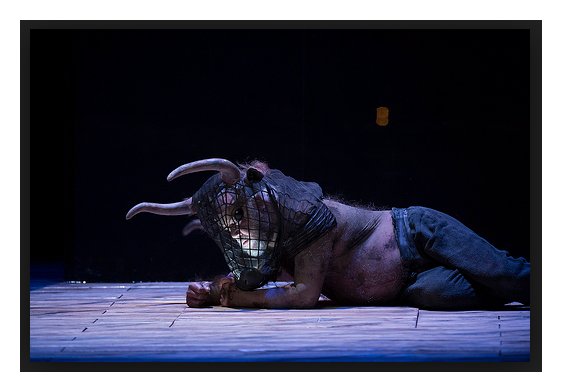

 BD: So they look at the Ring as an entity, rather than as four
individual pieces?
BD: So they look at the Ring as an entity, rather than as four
individual pieces? BD: So Hagen has no free will whatsoever?
BD: So Hagen has no free will whatsoever? BD: Even though you’re
doing Wotan,
you haven’t retired Hagen from your repertoire?
BD: Even though you’re
doing Wotan,
you haven’t retired Hagen from your repertoire? BD: So we’ve having to make a hundred per cent
of our decisions based solely on this one per cent of information?
BD: So we’ve having to make a hundred per cent
of our decisions based solely on this one per cent of information? BD: Were Wotan and Fricka ever happy?
BD: Were Wotan and Fricka ever happy? BD: So he hasn’t reasoned it all out yet?
BD: So he hasn’t reasoned it all out yet? Sir John: [Hesitates]
I don’t see it like that. He’s seeing his own death, and he’s going
for it heroically. Of course in typical Wotanesque fashion, he’s not
absolutely rational and calm about it.
Sir John: [Hesitates]
I don’t see it like that. He’s seeing his own death, and he’s going
for it heroically. Of course in typical Wotanesque fashion, he’s not
absolutely rational and calm about it.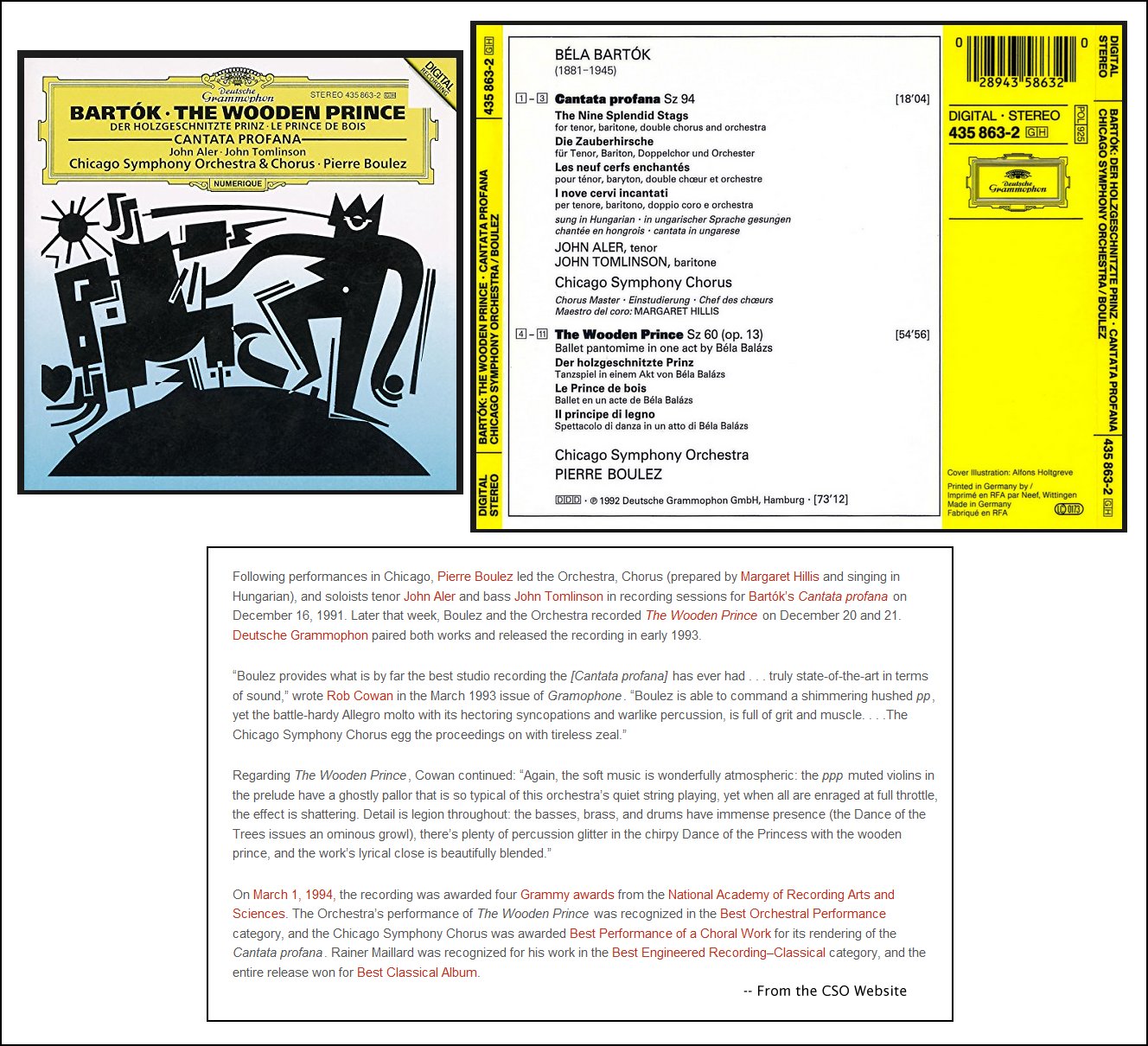
 Sir John: That sounds
easy, doesn’t it?
Sir John: That sounds
easy, doesn’t it?  BD: How do you select
which new roles you will learn?
BD: How do you select
which new roles you will learn? Sir John: I don’t think
there were any surprises because he was tremendously inspirational in both.
Sir John: I don’t think
there were any surprises because he was tremendously inspirational in both.
 BD: What other recordings
are coming along soon?
BD: What other recordings
are coming along soon?